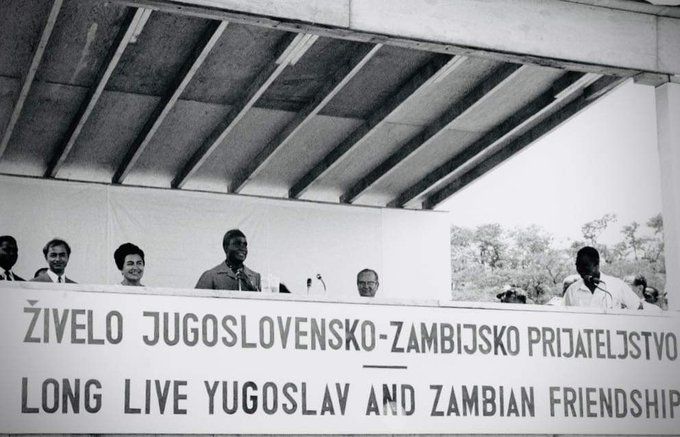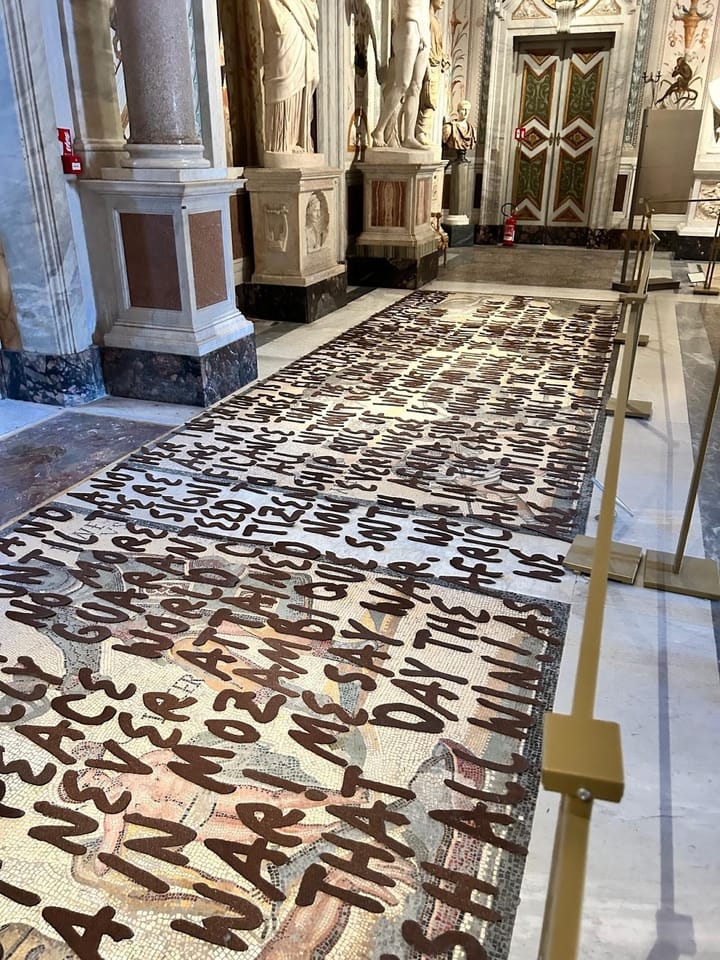Context[1]
A book which I edited and which has been published recently Socialist Yugoslavia and the Non-Aligned Movement: Social, Cultural, Political and Economic Imaginaries,[2] whilst not primarily oriented to the field of Postcolonial studies, certainly addresses a number of important questions regarding socialist Yugoslavia's enrolment in transnational forms of decolonial solidarity and some of the ambivalences and contradictions this entailed. The Introduction and fourteen chapters discuss a very wide range of themes and, crucially, there is no party line being enforced; the book is conceived deliberately as an arena for diverse approaches from different disciplinary traditions including history, international relations, cultural studies, art history, politics, sociology and anthropology. The book also includes a range of modes of address, or narrative styles, featuring a graphic novella[3] and an essay using still images from Yugoslav documentary film archives,[4] alongside more traditional academic texts. The book celebrates not only different modes of argumentation but, also, promotes different conclusions about the role of socialist Yugoslavia and the importance of the Non-Aligned Movement (NAM) in global decolonial historiography. Explicit disagreements between authors are salient reminders of the contradictions and complexities of the topic and the need for much more research. Some of the themes missing from the book, as well as problems related to the book's broad conceptualization, are also generative of the need for continued discussion and debate, I would suggest.
Work on NAM, and in particular on the role of socialist Yugoslavia within it, has grown considerably in recent years. The 18 authors in the book could have been joined by very many others, all of whom are breaking down artificial divisions between disciplines, between academia and activism, and between scholarly work and artistic and cultural production.
Although the topic never completely went away, the political context of the post-Yugoslav space was hardly conducive to such work – in Croatia, where I live, for example, it is still implicitly forbidden on national television to refer to socialist Yugoslavia; the phrase „former state“ tends to be used instead. The autocratic regime in Serbia tends to remember NAM only on the occasions of significant anniversaries; most recently, in 2021, the sixtieth anniversary of the initial summit in Belgrade in September 1961 where a rather distorted, revisionist, history of NAM was presented to the world, with the Russian Federation as a special guest of honour. Most importantly, more traditional, top-down“ diplomatic histories of NAM are now being joined by work which explores the spaces NAM offered, explicitly and implicitly, for important transnational exchanges,from below“ in the realms of science, art and culture, education, architecture and industry, and beyond. The best of this work displays a very clear decolonial or postcolonial sensibility, focusing on multiple nodes and diverse trajectories and rejecting crude nostalgia in favour of critical and conjunctural forms of analytical engagement.
The Non-Aligned Movement
Newsreel footage of the 1961 Belgrade summit which is available[5] speaks of “new vistas of hope for an anxious world” and lists the following questions as the priorities of the event: “the general situation in the world; the establishment and strengthening of international peace and security; respect for the right of nations to self-determination; the struggle against imperialism and the liquidation of colonialism and neo-colonialism; respect for the sovereignty and territorial integrity of states and non-interference in their internal affairs; racial discrimination and the policy of apartheid; general and complete disarmament, the banning of nuclear experiments and the maintenance of military bases on foreign territory; peaceful co-existence amongst states with different social systems; the role and structure of the United Nations and the application of its resolutions; unequal economic development; and the improvement of international economic and technical co-operation." Adding themes such as: climate change and ecology, migration, gender equality, and digital inequality, perhaps, would update the list and make it still relevant for a renewed decolonial internationalism today.
Questions of how the Non-Aligned Movement came into being and, perhaps even more importantly, its significance at the interface of the Cold War and the slow defeat of colonial rule, are hard to answer. Certainly, the Yugoslav break with Stalin in 1948, followed by a failure to secure meaningful co-operation with other Balkan states, meant that socialist Yugoslavia had to look elsewhere to prevent its total isolation. The Yugoslav Partisans’ struggle against Fascism had created the conditions for an anti-fascist internationalism with a kind of decolonial logic of its own. Tito’s radical defence of the principle of ‘self-determination’ and his critique of an understanding of world revolution based on the “unconditional subordination of small socialist countries to one large socialist country”[6] also resonated with many decolonial states, unwilling to swap colonial rule for the undue influence of one or other power bloc. In April 1955, of course, the Bandung Conference of Afro-Asian states took place, to which Yugoslavia was not invited. Attempts to organise a follow-up to Bandung came to nothing, not least because of a continued border dispute between China and India, and this, undoubtedly, “contributed to the emergence of the non-aligned states”,[7] although the nature of the link between Bandung and Belgrade is disputed, including within the book I edited.
There can be no doubt that socialist Yugoslavia was, first and foremost, a modernising project and that, indeed, socialist Yugoslavia brought its own particular stance on modernisation into the always already modernising project of NAM. This was conceived in terms of rapid industrialisation and urbanisation, as well as the modernisation of agricultural production and the expansion of education, welfare and mass literacy. Central to post-colonial scholarship is a questioning of modernity, even a kind of counter-hegemonic modernity - hence the deep ambivalence, I suggest, reflected, for example, in Piro Rexhepi’s recent questioning of an image of Yugoslav socialism as “the redeemer of the brighter side of modernity”.[8] Hence, it is the complex relationship between modernity, developmentalism and economic and political order that is at stake.
As Catherine Baker has suggested in her brilliant book Race and the Yugoslav Region: Postsocialist, post-conflict, post-colonial?[9] as much as “non-alignment built identification with global anti-colonial struggle into the narrative of Yugoslavia’s state identity”, this was an anti-colonialism that was, often “race-blind” and Eurocentric. There were also gaps between the rhetoric and the reality and between state-sponsored narratives and everyday lives. How socialist Yugoslavia was inscribed into what Baker has termed “global raciality” is an emerging theme in the literature and, of course, crucial in terms of questions of its positioning around decoloniality. There was real, and tangible, support from the Yugoslav side for decolonial liberation movements that predated NAM and these, certainly, adhered to a racialized understanding of political struggle. At the same time, it is certainly the case that strong condemnation of apartheid in South Africa and (what was then) Rhodesia in every NAM event tended to frame such extreme racialized hierarchies and exclusions as exceptional rather than as general. One can certainly find examples of what Baker terms a “race-blind” stance,[10] that Byrne terms “non-racial”[11] and which I term “deracialized anti-racism”.
As Byrne has argued, socialist Yugoslavia showed no particular interest in furthering “the convergence of different strands of Third Worldist mobilisation, including Afro-Asianism, non-alignment, Arab nationalism, and pan-Africanism”,[12] as the Algerians would have wanted and as would have been compatible with a broad identification with emerging Third World decolonial socialisms. Indeed, there was little integration of diverse traditions of radical Black and decolonial thought into the knowledge circulating within Yugoslav intellectual circles, including the dissident Praxis group of philosophers whose work was marked by a deeply entrenched Eurocentrism.[13] The presence of significant numbers of students from the Global South, some of whom were politically active, was also no guarantee against racial discrimination or police surveillance.[14] In short, understanding NAM must address its ‘architecture of complexity’[15] and focus attention on relationships, flows and trajectories, based on rigorous empirical and historiographical research in which the capacity to be surprised matters rather than linear and deterministic longue durée approaches or, indeed, the kind of work that, first, reaches conclusions, and then finds “facts” to support those conclusions.
Two autocritiques
Looking through a decolonial lens, two problems with the book are rather apparent. The first relates to the problem of “Yugocentrism” – a focus primarily on Yugoslavia and Yugoslav sources (mainly, it should be said, those in Bosnian-Croatian-Serbian language). Indeed, my critique of Yugocentrism was developed in a text published before the book itself,[16] where I argued for the need for a double movement bringing Yugoslavia back into global historiography but also decentering its positionality, ensuring that other sites of analysis and struggle, and the relations between them, are addressed. Historiography firmly rooted in anti-colonial struggles in Africa, Asia and Latin America is of vital importance in a reconsideration of the significance of non-alignment, and this may also mean decentering NAM itself, because the movement does not have the same resonance, not least amongst amongst scholars, in other non-aligned countries. In my Introductory text in the book, I outline the nature of Yugoslavia’s “liminal hegemony” of the movement, steering the movement for, at least, its first decade, often drafting communiques in advance, and concerned when other countries sought to take a more pro-active role. The Yugoslavs sought to “de-ideologize” NAM meetings, keeping contentious issues off the agenda and steering a line that tried to be equally critical of the two main power blocs. At times, Yugoslav conservatism led it to oppose more radical initiatives such as Sukarno’s Conference of New Emerging Forces (CONEFO) or the Havana Tricontinental meeting. Often, real and tangible acts of decolonial affinity existed side by side with a search for new markets, including arms markets, at any cost.
A second autocritique of the book is the tendency to treat socialist Yugoslavia as a homogenous entity failing, for example, to include work that focuses on the role of the constitutive Republics particularly after the Constitution of 1974 that gave the Republics much greater autonomy. The nature of the internal divisions in Yugoslavia was such that more work on the different meanings that non-alignment had for different groups across space and time is certainly needed. Indeed, something of the strong link between “internal” and “external” policies in socialist Yugoslavia is revealed in a quote from 1983 by former Minister of Foreign Affairs Josip Vrhovec who stated: “Non-alignment should be seen as a factor acting within Yugoslavia, and not simply as Yugoslavia’s outlook on the world. It is in this respect that non-alignment appears as one of the essential political factors of Yugoslavia’s internal cohesion".[17] Indeed, more work should be undertaken on the not insignificant role that different interpretations of Yugoslavia’s commitment to non-alignment played in Yugoslavia’s disintegration. Work on the New International Economic Order suggests that, in the context of the second oil price crisis of 1979, the fact that leading oil producing NAM Member States did not provide cheap credits or establish an emergency fund to support oil-dependent members, had massive implications for the deep economic and social crisis that gripped Yugoslavia in the 1980s.[18] The richer Northern Republics in Yugoslavia then became reluctant to support the poorer Republics in the South and, indeed, withdrew funding from some Federal institutions, using the trope of the problematic nature of Yugoslavia’s involvement with the Global South instead of a more rational turn to Europe and the West.
The right to self-determination, perhaps the central principle of NAM, was, often, more of an empty signifier when it came to similar rights within sovereign nation states, including in Yugoslavia. Indeed, Yugoslavia’s commitment to decolonial solidarity with others did not prevent the oppression of those constructed as Others within Yugoslavia, notably Albanians, Muslims and the Roma population. To what extent the concept of “internal colonialism” can be applied to socialist Yugoslavia is an important question, answerable only through conjunctural analysis. The significance of transnational religious identifications made possible, in part, through non-aligned mobilities, is also worthy of study. It would be wrong to conceive of socialist Yugoslavia as only promoting secularised modernity – at times, it reached out to the Vatican and to liberation theology in Latin America as a source of shared non-aligned ideals. The rise of transnational Islamic sentiment and the development of Pan-Islamism is, also, worthy of study, in terms of the conjunctural specificities of, at times, being complementary to, and at times competing with, non-alignment as a form of counter-hegemonic worldmaking. In terms of economic relations, Yugoslavia’s support for the New International Economic Order was, always, somewhat half-hearted and recent work within dependency and world systems theory suggests that Yugoslavia occupied an intermediate position in the global division of labour, benefitting its own emergent transnational techno-managerial class, and, indeed, exhibited neo-colonial and extractivist tendencies in terms of its trade with the Global South.[19]
In conclusion, there is a need for burgeoning research on socialist Yugoslavia and the Non-Aligned Movement to connect with other, no doubt also contradictory, national and transnational decolonial awakenings, forms of counter-hegemonic worldmaking, and their contorted, contested and contingent inter-relationships. This could contribute to a deeper global historiography which, in Daphne Taylor-Garcia's words „works to redefine the very conditions in which knowledge is produced and legitimated, situating ethical relationships as central, and recognizing that what is put forward is the basis for thinking through another world“.[20] In this sense the stakes are high, but the room for more work and greater dialogue is certainly real.
Paul Stubbs is a Liverpool-born sociologist and currently a Senior Research Fellow at the Institute of Economics, Zagreb, Croatia. He has lived in Croatia since 1993 and was an anti-war activist in the 1990s. He has edited a recently published book Socialist Yugoslavia and the Non-Aligned Movement (McGill-Queen's University Press, 2023) and is the author of the Introductory chapter. His research interests include: global social policy, policy translation, new left-green urban political movements, and poverty and social exclusion. His books include Social Inequalities and Discontent in Yugoslav Socialism (edited with Rory Archer and Igor Duda, Routledge, 2016) and Making Policy Move (with John Clarke, Dave Bainton and Noemi Lendvai, Policy Press, 2015). He is currently working on a history of the New International Economic Order.
[1]This is an extended, annotated, version of my opening intervention in an online book launch event „Decolonial Contradictions – a dialogue“ organised by the Centre for Advanced Studies, University of Rijeka. Thanks to CAS for organising and to Rada Iveković and Piro Rexhepi for taking part. The entire discussion can be found online at https://www.youtube.com/watch?v=bgu_cmZdqao
[2]Paul Stubbs (ed.) (2023) Socialist Yugoslavia and the Non-Aligned Movement: Social, Cultural, Political and Economic Imaginaries, Montreal: McGill-Queen’s University Press. https://www.mqup.ca/socialist-yugoslavia-and-the-non-aligned-movement-products-9780228014652.php
[3]Bojana Piškur and Đorđe Balmazović (2023) “Non-Aligned Cross-Cultural Pollination: A Graphic Novel”, in Stubbs (ed).
[4]Mila Turajlić (2023) “Film as the Memory Site of the 1961 Belgrade Conference of Non-Aligned States”, in Stubbs (ed.)
[5]https://www.youtube.com/watch?v=vfsjKTj4Qpw
[6]Josip Broz Tito. 1963. Selected Speeches and Articles, 1941-1961. Zagreb: Ognjen Prica, p. 20.
[7]Dinkel, Jürgen. 2019. The Non-Aligned Movement: Genesis, Organization and Politics (1927-1992), Leiden: Brill, p. 83.
[8]Piro Rexhepi (2023) White Enclosures: Racial Capitalism and Coloniality Along the Balkan Route, Duke University Press. p. 39
[9]Catherine Baker (2018) Race and the Yugoslav Region: Postsocialist, post-conflict, postcolonial? Manchester University Press. https://www.manchesteropenhive.com/display/9781526126610/9781526126610.xml
[10]Baker, op.cit.
[11]Byrne, Jeffrey James. 2015. “Beyond Continents, Colours, and the Cold War: Yugoslavia, Algeria, and the Struggle for Non-Alignment.” The International History Review, 37 (5): 912-932.
[12]Byrne, op. cit., p. 924
[13]Nikolay Karkov (2015) „Decolonizing Praxis in Eastern Europe: towards a South-to-South dialogue“, Comparative and Continental Philosophy 7(2): 180-200
[14]Petra Matić (2022) “Solidarnost u nesvrstanom Zagrebu“, booksa 11 July, https://booksa.hr/u-fokusu/solidarnost-u-nesvrstanom-zagrebu?fbclid=IwAR1ajS79o8jN2y0NVn38E8VNjDmcO80pWv5uf2IFGmNcyvw1v3OZPRlpUK0 and „Obični ljudi, ali istovremeno i nisu“, booksa 8 August, https://booksa.hr/u-fokusu/obicni-ljudi-ali-istovremeno-i-nisu?fbclid=IwAR1cWut3MwpJlOOU16Z_y7XBaLbnDUVZBkdwjNRgIG0ldo5ptYV-xBtD_iw
[15]Albert-Laszlo Barabasi (2007) “The Architecture of Complexity”, IEEE Control Systems Magazine https://barabasi.com/f/226.pdf
[16] Paul Stubbs (2021) “Yugocentrism and the Study of the Non-Aligned Movement: Towards a Decolonial Historiography”, History in Flux 3(3): 133-55,
[17] Josip Vrhovec (1983) “Tito-Yugoslavia-Non-Alignment” in Emil Piril (ed.) Non-Alignment Spektar: Zagreb, pp. 14-16.
[18] Ljubica Spaskovska (2021) “’Crude Alliance”: Economic Decolonisation and Oil Power in the Non-Aligned World”, Contemporary European History 30(4): 528-43.
[19]Rade Pantić (2023) “Kraljevina SHS /Jugoslavija kao periferna kapitalistička društvena formacija“, IFDT Belgrade, https://www.youtube.com/watch?v=GG_5arKE7CQ
[20]Daphne V. Taylor-Garcia (2012) “Decolonial Hitoriography: thinking about land and race in a transcolonial context,” In Tensions 6, http://www.yorku.ca/ intent/issue6/articles/pdfs/daphnevtaylorgarciaarticle.pdf



